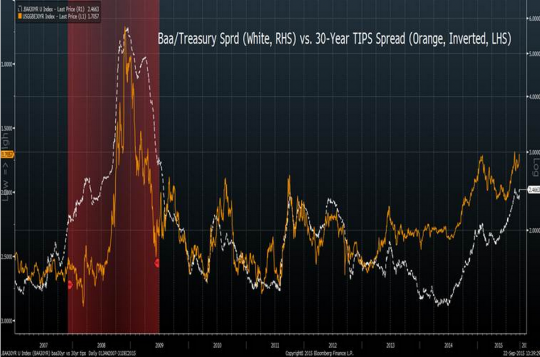Michael Darda sent me a graph that provides another good example of how nominal shocks have real effects. The graph compares the spread between Baa bond yields and T-bond yields (white line) with an inverted measure of 30 years TIPS spreads (orange line). The TIPS spreads are inverted because the BAA/Treasury spread is a countercyclical variable, whereas TIPS spreads are procyclical:
I really love this graph, because it shows an underlying relationship that many people over look. Always focus on the deep forces driving the macroeconomy, not the symptoms of those deep forces.
So here’s what’s going on. Tight money leads to lower expected future NGDP growth. I don’t think that can be disputed. And I’d also claim that slower expected NGDP growth usually leads to lower TIPS spreads. In addition, slower nominal GDP growth usually leads to increased fears of debt defaults. Recall that NGDP represents total gross nominal income, the total resources that people, businesses and governments have available to repay nominal debts. Squeeze that amount and defaults increase.
When NGDP grows more slowly, TIPS spreads fall and debt defaults increase. That is even true in an economy where wages and prices are flexible, but debt is denominated in nominal terms. But it’s even worse in the actual economy we live in, where wages are sticky. In that case slower NGDP growth also leads to lower RGDP growth, which puts even more pressure on borrowers, leading to even more defaults. Hence the Baa/Treasury spread widens. And note that the Baa/Treasury spread is a real variable. Hence nominal shocks have real effects.
Of course the correlation is not perfect because TIPS spreads aren’t really the variable we care about, it’s NGDP expectations that really matter. Notice the gap in the first half of the recession (roughly the first half of 2008.) That was a period where inflation diverged sharply from NGDP growth. Money was tighter than the inflation numbers suggested.
